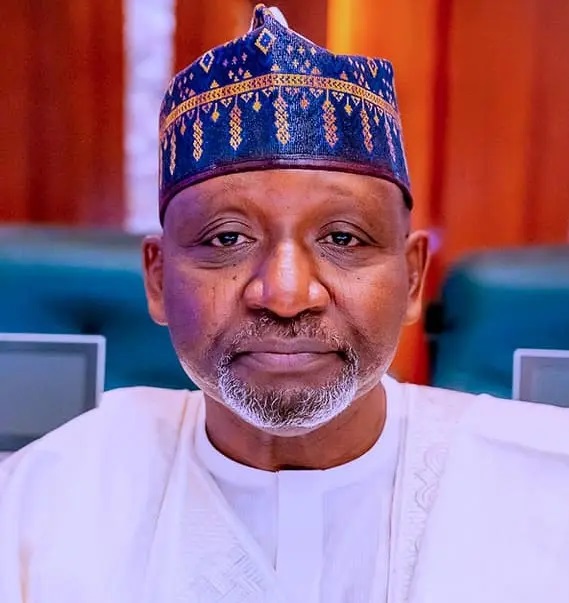News
Nigeria duty bound to ensure safer maritime environment – Minister

The Minister of Transportation, Mu’azu Sambo, says Nigeria is duty bound to contribute to global efforts to ensure safer environment in all sectors, including shipping.
Sambo said this at the 2022 International Maritime Organisation (IMO) World Maritime Day celebration on Thursday in Lagos, adding that Nigeria was targeting zero carbon shipping by 2050.
The event had the theme, “New Technologies for Greener Shipping.”
He said there was need for the global maritime community to prioritise the imperative of sustainable policies, practices and projects, which would ensure the protection of the immediate marine environment and survival of mankind.
According to Sambo, the need for new technology to drive the maritime sector has become imperative, hence all hands must be on deck to support a green transition of the maritime industry into a sustainable future.
“A green future equally implies the commitment by the private sector, to invest in more modern platforms and assets, which will meet the emission levels of the future.
“It is against this backdrop that I earlier stated my commitment to the actualisation of the Cabotage Vessel Financing Fund (CVFF), which I am convinced will offer a veritable platform for the acquisition of newer vessels by our indigenous operators.
“A greener and sustainable maritime industry is achievable if we work together in partnerships in the formulation and implementation of our roadmap for the maritime sector in Nigeria and globally,” he said.
The Minister of State for Transportation, Mr Ademola Adegoroye, said to attain greener shipping, it was imperative that new technologies be embraced through aggressive technology transfer, research and development, innovations and partnership.
He said if stakeholders from both public and private sectors in the maritime industry worked together, a greener shipping regime would be attainable.
“The topic is also relevant in addressing specific aspects of the United Nations Sustainable Development Goals (SDGs).
“It is relevant particularly on SDG 9, 13, 14 and 17 on industry, innovation and infrastructure, climate action, sustainable use of the oceans, seas and marine resources and the importance of partnership and implementation to achieve the goals,” he said.
Dr Taiwo Afolabi, Founder SIFAX Group, pointed out that addressing the impact of burning fossil fuel, be it in ships or power stations, though global, must be addressed at national level.
Afolabi represented by Capt. Ibraheem Olugbade, Executive Director at SIFAX Group, added that environmental damage was not discriminatory, as it affected the rich and not so rich, old and young and those who could not afford basic healthcare.
“It is expected that the federal ministry of transportation and her agencies should lead, while stakeholders across the maritime sector collaborate in finding solutions for the future.
“Also finding solutions for renewable fuel productions for the shipping industry for a greener, more equitable and more sustainable maritime future,” he said.
Afolabi pointed out that new technologies for greener shipping would open up a larger conversation about the direction of shipping and how technologies could be harnessed for a more sustainable future.
Dr Bashir Jamoh, Director General, Nigerian Maritime Administration and Safety Agency (NIMASA), said NIMASA would play its role in energy transition of shipping and would push boundaries towards achieving a net zero carbon shipping by 2050.
Jamoh said the initiative required global team effort, “and our message to our partners in government and industry is let’s work together and proactively support the transition to a greener and more sustainable maritime sector for Nigeria, Africa and the world.”
Jamoh explained that NIMASA’s strategy for net zero carbon emission shipping centered on adoption of a national action plan, provision of incentives and financial mechanisms and global and regional cooperation.
Also, Mr Mohammed Bello-Koko, Managing Director, Nigerian Ports Authority (NPA), noted that bringing environmental efficiency and digitisation to the maritime industry was a duty everyone owed the habitat.
“Eco-friendly port is very much in tandem with the NPA’s resolve to identify with the rest of humanity in contribution to the share of shipping industry in reducing hazardous emissions within the marine environment.
“Realising that automation is the pillar of port efficiency, we are working assiduously under the technical guidance and consultancy of the IMO to deploy the Port Community System (PCS).
“This will afford us the platform needed to develop a cocktail of digital solution that can make ships more energy-efficient, reduce pollution, while at the same time ensuring the global competitiveness of Nigerian ports through eco-friendly services,” he said.
Earlier, Dr Magdalene Ajani, Permanent Secretary, Federal Ministry of Transportation, said the theme of the event reflected the need to support a green transition of the maritime sector into a sustainable future.
Ajani added that the transition would be through promotion of inclusive innovation and uptake of emerging technology, especially in the context of developing countries, and in particular the Small Island Developing States (SIDS) and Least Developed Countries (LDCs).
“This year’s presentation will address challenges and explore opportunities for new technologies to accelerate the transition of the maritime sector towards a greener zero/low-emission future,” she said.




 Davido's Net Worth & Lifestyle
Davido's Net Worth & Lifestyle 
